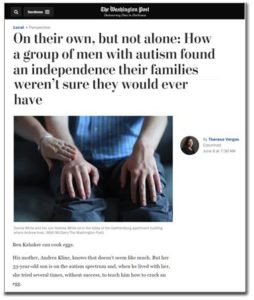We have some very exciting news to share – ILO at the Crossings is in the Washington Post! In an article titled, “On their own, but not alone: How a group of men with autism found an independence their families weren’t sure they would ever have”, author Thersa Vargas talks to ILO self advocates about their experiences with independent living and ILO. Please see the below text of the article, or follow this link to see it on The Washington Post website.

On their own, but not alone: How a group of men with autism found an independence their families weren’t sure they would ever have
Theresa Vargas, The Washington Post
Ben Kabaker can cook eggs.
His mother, Andrea Kline, knows that doesn’t seem like much. But her 33-year-old son is on the autism spectrum and, when he lived with her, she tried several times, without success, to teach him how to crack an egg.
Only after he moved into his own apartment did he finally, with the help of a life coach, learn how to do it.
“Ben can crack eggs,” Kline says, smiling at the simplicity and the grandness of that statement. “To me, that’s important because it is another step forward, it’s something Ben can do without me.”
It also offers her a basic reassurance: If he can cook an egg, he can eat. He can survive.
For many parents of children with developmental and intellectual disabilities, a constant concern, one that hovers over short-term worries and nags even when everything is going well, is this: What will happen when I’m gone? Who will take care of my child then?
Some Washington-area families say they have found an answer that gives them comfort and that they hope may serve as a model for others.
To see it, I spent a recent afternoon inside a Gaithersburg apartment building called the Crossings.
There, seven men with autism and other developmental disabilities, live in their own apartments. The building is not a group home. It is a five-story complex with a fitness center and a swimming pool that advertises itself to the general public as “a brand new affordable apartment community featuring 1, 2 and 3 bedroom apartment homes.”
But the men’s families, through an organization called Integrated Living Opportunities, have created a unique and intentional community for them. They have given them a way to live on their own and yet never feel alone. The seven men get together for activities, such as movie nights and workout sessions. They have a life coach and a “community builder,” which is a staff person who checks on each of them daily and brings them all together weekly.
On the afternoon Kline spoke to me about her son, another resident, Andrew White, sat with us.
“Speaking of eggs,” he said.
His mom, Donna White, sat next to him and gently asked, “Is this going to be relevant to what we’re talking about?”
“No,” the 26-year-old said.
White was one of the first of the seven men to move into the building in November 2016. I asked him what he thought when he first saw his one-bedroom apartment. Without hesitation, he said, “I thought I was going to have the most plush apartment in Maryland.”
His mom recalled that, on the day he moved in, she and her husband went to Ikea to buy furniture. By the time they returned two hours later, he had put up his Christmas tree and decorated it with ornaments.
Now, his apartment is adorned with characters from the cartoon “SpongeBob SquarePants.” Pictures of them cover walls in every room, from the kitchen, where his signature dish has become “steak and mashed potatoes,” to the bedroom, where he keeps an impressive collection of Funko figures and a diploma showing he received an associate degree from Montgomery College.
“Day-to-day, he can handle his own life and pay his own bills,” his mom said.
“As a matter of fact, I pay them as soon as I get them,” he said.
Maedi Tanham Carney calls what is occurring at the Crossings “a complete success story.” She and five families founded Integrated Living Opportunities in 2014, after receiving guidance from the Center for Independent Futures in Evanston, Ill. None of the founders knew each other before coming together, but they all lived in the Washington region, had children with developmental and intellectual disabilities and were looking for ways to help them live independently.
“Moving into four walls does not make you independent,” said Debbie Fickenscher, whose family was among the founders. Her daughter has Down syndrome and lives with a roommate in Germantown. “You need skills. You also need a community.”
Carney said the nonprofit counts among its members 28 families and has helped create “pods of communities” in the District, Virginia and several places in Maryland. In Bethesda, two people live next door to each other. In the District, because affordable housing is harder to find, several people live in different parts of the city but share a “community builder” who checks on them and makes sure they connect with one another.
The situation at the Crossings is the most ideal, Carney said, because the men share a building and can walk to the pharmacy or the park together, which they do. On a recent night as they worked out in the fitness center, one man talked about an upcoming job interview he had and another about how the buses seem to be getting more dangerous.
Part of what also makes the community work is that the residents aren’t building it alone. Their relatives also gather for regular meetings. Carney recalled one that occurred shortly after Ben Kabaker, who works remotely as a medical coder, moved into his apartment. At that meeting, Carney said Kabaker’s father came up to her.
“He said, ‘I never thought the day would come when Ben would be living on his own,’ ” she said.
Donna White recalled another gathering when she confessed something that she knew those in the room would understand in a way that others might not. It had been a particularly trying time for her because of a series of family illnesses and injuries. Without even realizing it, she had allowed three days to go by without checking on her son.
“I had so much going on. I kind of forgot he existed,” she recalled saying.
She realizes that sounds bad. But what it signified, and what she had no doubt the other families would get, was that she knew Andrew would be okay.
“Speaking of being okay,” he said.
